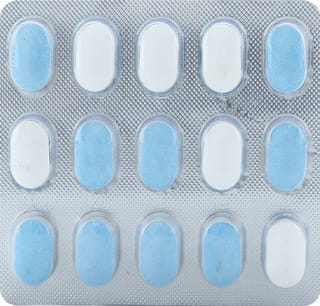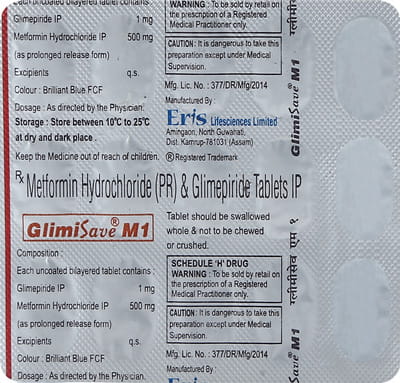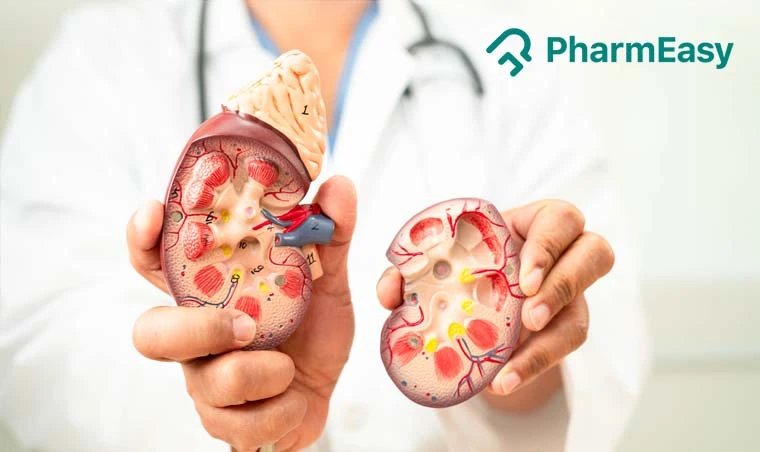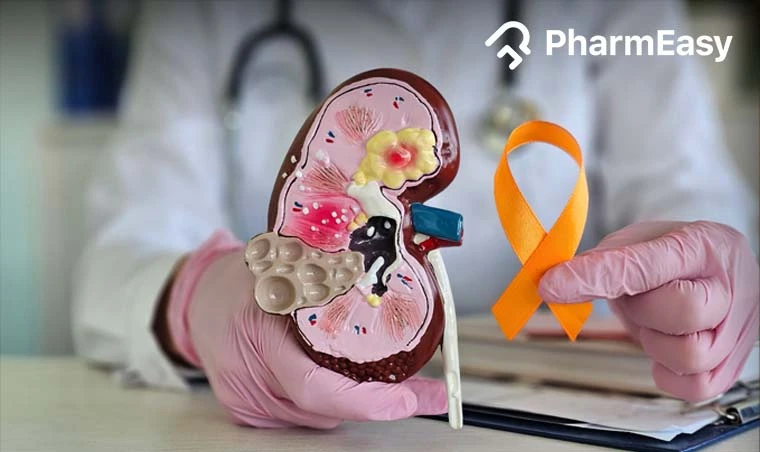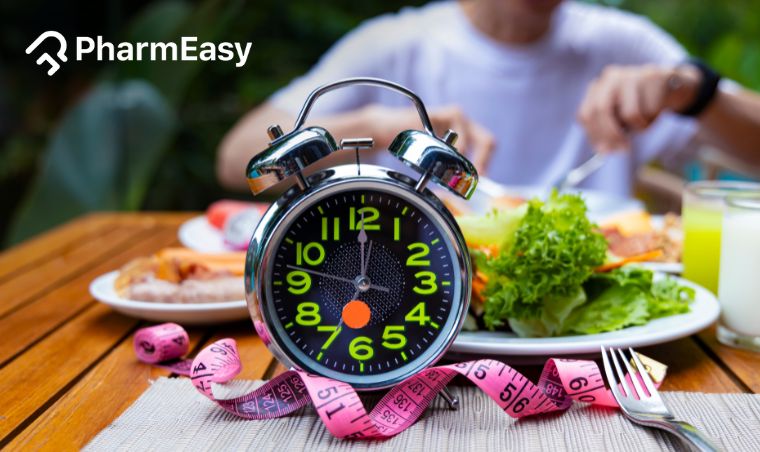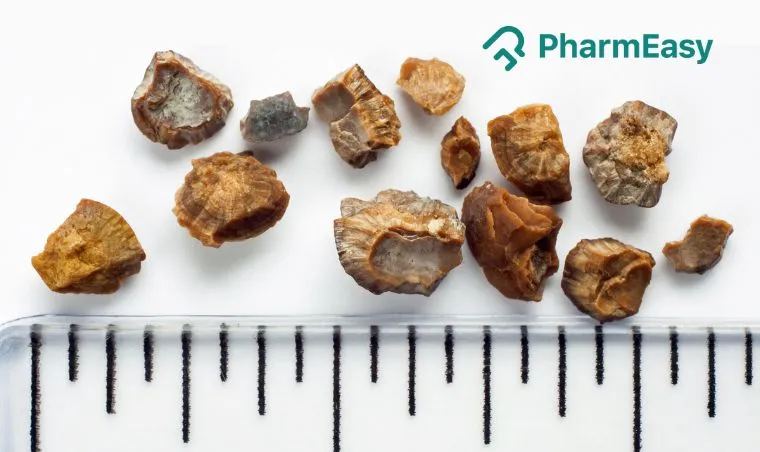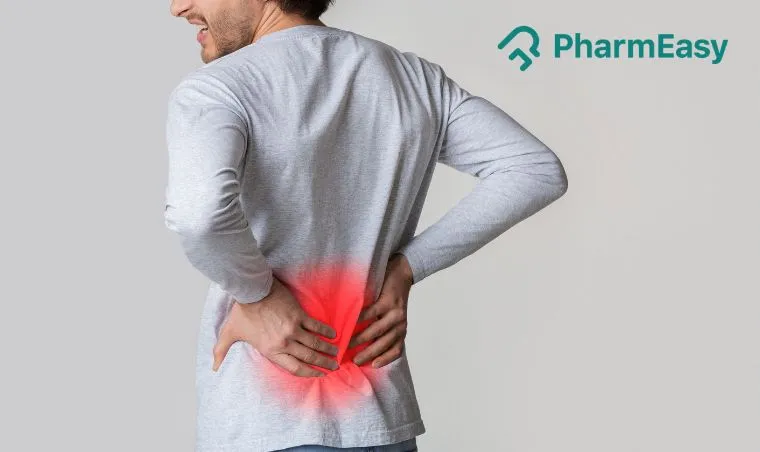Glimisave M1 Tablet
Description
Glimisave M1 Tablet is an anti-diabetic medicine used to lower the raised blood glucose levels in the blood when it is not being controlled by diet and exercise. This medicine is used to treat Type 2 diabetes mainly. It contains a combination of glimepiride and metformin as its active ingredients. Take this medicine as prescribed by your doctor, preferably after meals. Glimisave M1 Tablet should not be used in children below 18 years of age. Do not stop taking this medicine, as it can result in increased blood sugar levels and complications. Side effects of this medicine are disturbance, nausea, vomiting, diarrhoea. Mostly these side effects get resolved over a short time. If it worsens, reach out to the nearest clinic or hospital.
Product Summary
| Offer Price | ₹124.54 |
| You Save | ₹41.51 (25% on MRP) |
| Contains | Glimepiride(1.0 Mg)+Metformin Hydrochloride(500.0 Mg) |
| Uses | Type 2 Diabetes mellitus |
| Side effects | Nausea, low blood sugar, vomiting, taste disturbance, stomach pain |
| Therapy | ANTI-DIABETIC |

 Okamet Gm 501mg Strip Of 15 TabletsBy Cipla Gx15 Tablet(s) in StripMRP 130.39₹ 92.5826% CHEAPER₹ 6.17/Tablet
Okamet Gm 501mg Strip Of 15 TabletsBy Cipla Gx15 Tablet(s) in StripMRP 130.39₹ 92.5826% CHEAPER₹ 6.17/Tablet
Uses
Contraindications
- If you are allergic to metformin, glimepiride or any of the ingredients of the Glimisave M1 Tablet.
- If you are pregnant or are breastfeeding.
- If you have serious kidney failure or liver failure.
- If you have any metabolic acidosis (too much acid in the body fluids) like lactic acidosis, diabetic ketoacidosis or diabetic pre-coma.
- If you have dehydration, severe infections, shock and injections containing iodine.
- If you have had heart or lung failure, the recent incidence of heart attack and shock.
- If you are an alcoholic.
Side effects
- Weight gain, low blood sugar levels can cause headache, sweating, nausea, wet skin, anxiety and restlessness.
- Vomiting, nausea, diarrhoea, stomach pain, loss of taste sensation, metallic taste and stomach discomfort (pressure and fullness).
- High blood pressure, irregular heart rhythm, chest pain (arrhythmias).
- Rash, itching.
- Temporary visual disturbances.
- Difficulty in breathing, decrease in vitamin B12 levels.
Precautions and Warnings
Pregnancy
Breast Feeding
Driving
- Glimisave M1 Tablet can cause low blood sugar levels which can lead to drowsiness, unconsciousness or confusion. These can be dangerous while driving.
- Consult your doctor whether you can drive a car if you have frequent episodes of hypoglycemia.
- Keep a juice or chocolate in the car close to you while driving, in case you start feeling any of the above symptoms of hypoglycemia, immediately have the juice or chocolate.
- Note that artificial sweeteners are not of any use in such scenarios.
Alcohol
- It is advisable not to consume alcohol during treatment with Glimisave M1 Tablet.
- Alcohol alters the way this medicine works. Be cautious not to consume alcohol on an empty stomach. Alcohol increases the risk of low blood sugar.
- Excessive consumption of alcohol when taking this medicine can cause a serious complication known as ketoacidosis.
Other General Warnings
- You experience extreme hunger, headache, nausea, vomiting, sleepiness, restlessness, aggression, reduced alertness, confusion, shakiness or dizziness. These could be signs of low blood sugar. If you have any of these, immediately have sugar or sweet juice. Inform your doctor as you may need a change in your medicine's dose....
- You are experiencing pins-and-needles sensation, numbness and weakness.
- You are going to have a diagnostic imaging test that involves the injection of iodine.
- You have dehydration due to diarrhoea, vomiting or limited fluid intake.
- You have suffered through trauma.
- You have to undergo surgery shortly. You have serious kidney and liver problems. You have a thyroid disorder....
- You are overweight (specific diet restriction may be suggested).
Directions for Use
Storage and disposal
- Store it at room temperature in a dry place.
- Protect it from light and moisture.
- Keep it out of the reach of children.
Dosage
Overdose
- An overdose of the Glimisave M1 Tablet may lead to severe hypoglycemia (low blood sugar) and lactic acidosis (excessive lactic acid build-up). This can result in headaches, nausea, vomiting, sleep disturbances, restlessness, impaired alertness and reactions, depression, confusion, dizziness, etc. If you experience these, immediately take glucose or juice or sugar-containing products (sugar candy). Contact your doctor immediately or visit the nearest hospital as you may require close monitoring for the next few hours....
Missed a Dose
- A missed dose may lead to high blood sugar levels, which includes symptoms like feeling thirsty, excessive urination, loss of appetite, drowsiness, the fruity smell from breath, etc. If you have missed taking any dose of this medicine, take it as soon as you remember. If it's time for your next dose, then skip the missed dose and continue with your regular dose schedule. Do not take a double dose of medicine to compensate for the missed one....
Mode of Action
How Does It Work?
- Glimisave M1 Tablet is known to control blood sugar to a greater extent than metformin or glimepiride alone Glimiperide lowers the blood sugar level increasing release of insulin hormone from the pancreas....
- Insulin moves sugar (glucose) from the blood into the cells.
- Metformin decreases the absorption in the intestine and the production of sugar by the liver.
- Both of these components are known to increase the insulin sensitivity of the body (which allows the cells of the body to use blood glucose more effectively, reducing blood sugar).
Interactions
Interactions with other medicines
- Sometimes Glimisave M1 Tablet may affect the way other medicines work and other medicines may affect how Glimisave M1 Tablet works if taken at the same time.
- Always inform your doctor about all the medicine you are taking, that includes all prescribed or non-prescribed herbal medicines, dietary supplements as well as other treatment if you are taking for any disorders....
- Especially, if you are on certain medications like painkillers, medicines for heart diseases, muscle pain, brain-related disorder, antacids like ranitidine, anti-coagulants such as warfarin, medicine to lower blood cholesterol (fibrates), medicines for a thyroid disorder, antihypertensive medicines, etc....
- Other medicines that should be used with caution are antibiotics like Clarithromycin, oral contraceptives, anti-epileptic medicines like phenytoin, medicines for constipation, water pills, etc.
- You may have symptoms of low blood sugar if you are already taking other medicines for diabetes like Insulin, Pioglitazone. Caution is advised.
Content Details
Dr. Mahesh Muthe
MBBS
Dr. Ritu Budania
MBBS, MD (Pharmacology)
Frequently Asked Questions (FAQs)
Q: What kind of diet should I follow?
- A diet should be high in fibre, low in fat with adequate protein, carbohydrates, vitamins and minerals.
- Maintain the regular meal timings and try to have soups and salads.
- Diet should include boiled, steamed or baked food.
- Ensure moderate use of edible oils (groundnut oil, olive oil), very little use of ghee and butter.
- Drink at least 8-10 glasses of water daily.
- Carry fruit or low-calorie high fibre biscuits while travelling.
Q: What should I avoid being a diabetic patient?
- Do not shop when you are hungry. You could be tempted to buy oily and fried food.
- Avoid overeating.
- Avoid maida, white bread, potato, noodles, corn flakes, poori, biryani, naan, fried rice, etc.
- Stop having daals with ghee, deep-fried pulses.
- Avoid cream soups, carrot juice, deep-fried vegetables, vegetable curries with excess oil.
Q: My blood sugar falls too often, what could be the reason?
- Avoid skipping meals, fasting, too much alcohol intake, taking alcohol on an empty stomach and taking a double dose.
- If you are taking any medicines mentioned in the drug interaction section, you need to inform your doctor.
- Always keep a juice or sugar candy with you, in case you experience symptoms of hypoglycemia like headache, irritability, drowsiness, reduced alertness or nausea, immediately have the juice or glucose....
- Do not have artificial sweeteners in this situation.
- If such episodes happen too often, inform your doctor as you may need a decrease in the dose of this medicine.
Q: Can Glimisave M1 Tablet be stopped?
Q: What is the use of the Glimisave M1 Tablet?
Q: How does Glimisave M Tablet work?
- Glimisave M Tablet is known to control blood sugar to a greater extent than metformin or glimepiride alone. Glimepiride lowers the blood sugar level increasing release of insulin hormone from the pancreas....
- Insulin moves sugar (glucose) from the blood into the cells.
- Metformin decreases the absorption in the intestine and production of sugar by the liver.
- Both of these components are known to increase the insulin sensitivity of the body (allows the cells of the body to use blood glucose more effectively, reducing blood sugar).
Q: Does Glimisave M Tablet cause low blood sugar level?
References
- Amaryl M 1mg [Internet]. Sanofi.in. 2021 [cited 16 April 2021]
- CDSCO [Internet]. Cdscoonline.gov.in. 2021 [cited 16 April 2021]
- Kim HS, Kim DM, Cha BS, Park TS, Kim KA, Kim DL, Chung CH, Park JH, Jang HC, Choi DS. Efficacy of glimepiride/metformin fixed-dose combination vs metformin uptitration in type 2 diabetic patients inadequately controlled on low-dose metformin monotherapy: A randomized, open label, parallel group, multicenter study in Korea. J Diabetes Investig. 2014 Nov;5(6):701-8.[cited 13 Feb 2025]
- Sahay RK, Mittal V, Gopal GR, Kota S, Goyal G, Abhyankar M, Revenkar S. Glimepiride and Metformin Combinations in Diabetes Comorbidities and Complications: Real-World Evidence. Cureus. 2020 Sep 28;12(9):e10700.[cited 13 Feb 2025]
- NHS. How and when to take glimepiride [Internet]. London: NHS; [cited 13 Feb 2025]
Did you find this medicine information helpful?
Please rate your experience
Other Products from this Brand
- GLIMISAVE MV 3.3 STRIP OF 10 TABLETS
- GLIMISAVE M2 STRIP OF 15 TABLETS
- GLIMISAVE MV 2 STRIP OF 15 TABLETS
- GLIMISAVE M2 FORTE STRIP OF 15 TABLETS
- GLIMISAVE MV 1 STRIP OF 15 TABLETS
- GLIMISAVE M 0.5MG STRIP OF 15 TABLETS
- GLIMISAVE MV 3.3 F STRIP OF 15 TABLETS
- GLIMISAVE M1 FORTE STRIP OF 15 TABLETS
- GLIMISAVE M3 STRIP OF 15 TABLETS
